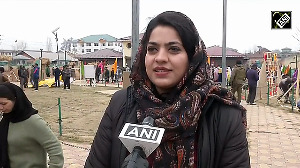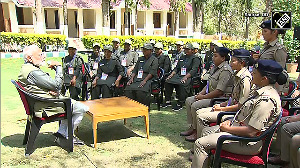...and say bye to the humanities-science divide, notes Ajit Balakrishnan.

Just the other day a prominent state university's professors invited me to join their discussion on how to modernise their curriculum.
When my turn to speak came, I said the most important first step in this modernisation effort was to start a course on digital humanities, initially at bachelor's level and allow students from arts or science backgrounds from schools to join.
As I was speaking, I noticed the quizzical look on the faces of practically all of the dozen or so professors in the room.
Then, one of them stood up and said: "I can guarantee you that not one of the students from an arts/humanities background will join the course: The word 'digital' will frighten them."
Once he said that, the rest of the professors in the room said: "We agree!"
"Do you know that the National Education Policy 2020 has a feature that data science will be taught in all schools in India from this year?" I asked.
That question of mine was met with bewildered looks.
I then pointed out this was a key suggestion of the 11-member expert group, in which I was, which created the NEP 2020, and I was thrilled when all the other members immediately accepted it and made it a key recommendation.
Even the implementation is under way now and I could see an initial textbook already ready (you can see it by searching for 'DATA SCIENCE GRADE VIII Teacher Handbook' on the internet).
The CBSE (Central Board of Secondary Education) school folks have also shown their enthusiasm for data science by making the following public announcement: 'The objective of this curriculum is to lay the foundation for Data Science, understanding how data is collected, analysed and how it can be used in solving problems and making decisions.
'It will also cover ethical issues with data including data governance and builds foundation for AI-based applications of data science.
'Therefore, (the) CBSE is introducing 'Data Science' as a skill module of 12 hours' duration in class VIII and as a skill subject in classes IX-XII.'
In other words, in three years we will be able to see a stream of college aspirants in India, excited by data science and eager to know more.
The exact wording for this goal in the NEP 2020 document is this: 'Multi-disciplinarity and a holistic education across the sciences, social sciences, arts, humanities, and sports for a multidisciplinary world in order to ensure the unity and integrity of all knowledge.'
One of the professors with me that day then raised his hand and asked: "Do you mean to say that all our children must learn computer programming and become computer programmers?"
No, I said, it's something like this: If you have to teach your young daughter how to ride a bicycle, you don't start by lecturing her about the physics of motion, then move on to lecture her about how rubber is made into tyres and metal is converted into bicycle parts.
You seat her on a bicycle, hold the cycle in place, get her to learn how to balance, tell her how to get her feet to the ground and balance herself, and so on.
Over time she will experiment and figure things out by herself.
Similarly, if a child must learn data science, he does not necessarily need to learn computer programming.
He can learn to look at, for example, the batting score from 10 matches for three cricketers and calculate which of them scored the most runs, the average score of each cricketer, and the standard deviation of the score of each cricketer... so we can judge who is most consistent in batting.
With such real-life examples, which all children are aware of, the key features of data science can be taught.
As I was saying all this, I could see a sense of relaxation among the professors, but also a sense of the challenges that lie ahead.
If executed correctly, citizens at all levels may jump into the upcoming digital world.
For example, as I stroll through my neighbourhood in Bombay, I can see small roadside fruit vendors and fish sellers display a QR code near their coir baskets and ready to accept digital payments.
Aadhaar now is carried by 1.2 billion Indians.
Nearly 300 million Indians now do online shopping.
And they all seem to have made this transition to the digital world enthusiastically and happily.

However, I couldn't but make some cautionary remarks: The spread of any new technological wave can also create a societal upheaval.
I still remember the 100-odd prosperous cotton textile mills in the Parel area of Bombay when I started working there after graduating from IIM-Calcutta in 1971 and how that world collapsed into strikes and violence with the arrival of far cheaper synthetic fibres like nylon and mixes like terry-cotton and the collapse of all 100-plus mills over the next eight-ten years.
The digital era, which data science is part of, will have its threatening aspects with a few elements like privacy, fake news, and digital fraud already starting to create anxiety.
To rationally deal with these threats and benefit from the opportunities, it is critically important that data science knowledge spread across all humans (lawyers, doctors, accountants...) and not just nerds, so that we as humans make the right choices.
Ajit Balakrishnan (ajitb@rediffmail.com), founder and CEO, Rediff.com, is an Internet entrepreneur.











 © 2025
© 2025